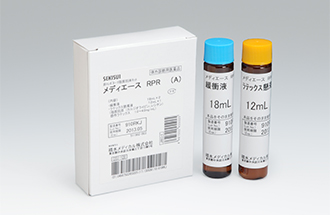MEDIACE RPR
We created this page for medical staff.
- *Read carefully the package insert before use.
Syphilis is a disease caused by the spirochete Treponema pallidum (Nichols strain, TP). Currently, two methods are available for serological testing for syphilis: a method using lipid antigens, such as cardiolipin (STS) and a method using TP antigens. As test results differ between these two methods depending on the stage, both are performed in conjunction to detect infection or to diagnose the disease state.
SEKISUI MEDICAL's "MEDIACE TPLA " and "MEDIACE RPR" are the world's first diagnostic reagents for syphilis on a fully automated system. These reagents are used to rapidly measure serum anti-TP antibodies and syphilitic antilipid antibodies using particles of the artificial carrier latex with a measurement principle based on latex turbidimetry.
Features
Non-treponema Lipid Antibody Kit MEDIACE RPR

- Marketing Approval Number: 21200AMZ00424000
- Unit : R.U . (RPR UNITS) for the reagent, which is based on the WHO international standard
- 1 R.U. is equivalent to the value using the RPR card method.
- *This package insert follows the Pharmaceuticals, Medical devices and Other Therapeutic Products Act of Japan.
Package
| Product Name | Package | Storage | |
|---|---|---|---|
| MEDIACE RPR (A) | Buffer Solusion | 2×18mL | 2-8℃ |
| Latex Suspension | 1×12mL | ||
| MEDIACE RPR (M) | Buffer Solusion | 1×60mL | 2-8℃ |
| Latex Suspension | 1×20mL | ||
| RPR Standard Serum * (5 concentrations) |
Syphilis Positive Human Serum | 1×5conc.×1mL | 2-8℃ |
| RPR Control* | RPR Control (Positive) | 2×Positive×1mL | 2-8℃ |
| RPR Control (Negative) | 2×Negative×1mL | ||
- *Not in vitro diagnostic products in Japan.
"MEDIACE" is a trademark or registered trademark of SEKISUI MEDICAL CO., LTD. in Japan and/or other countries.
We prepared this page for medical staff (doctors, dentists, pharmacists, clinical laboratory technicians, nurses, etc.) in Japan to ensure the correct use of our products. You should be aware that the information provided is not intended for overseas medical staff and the general public.